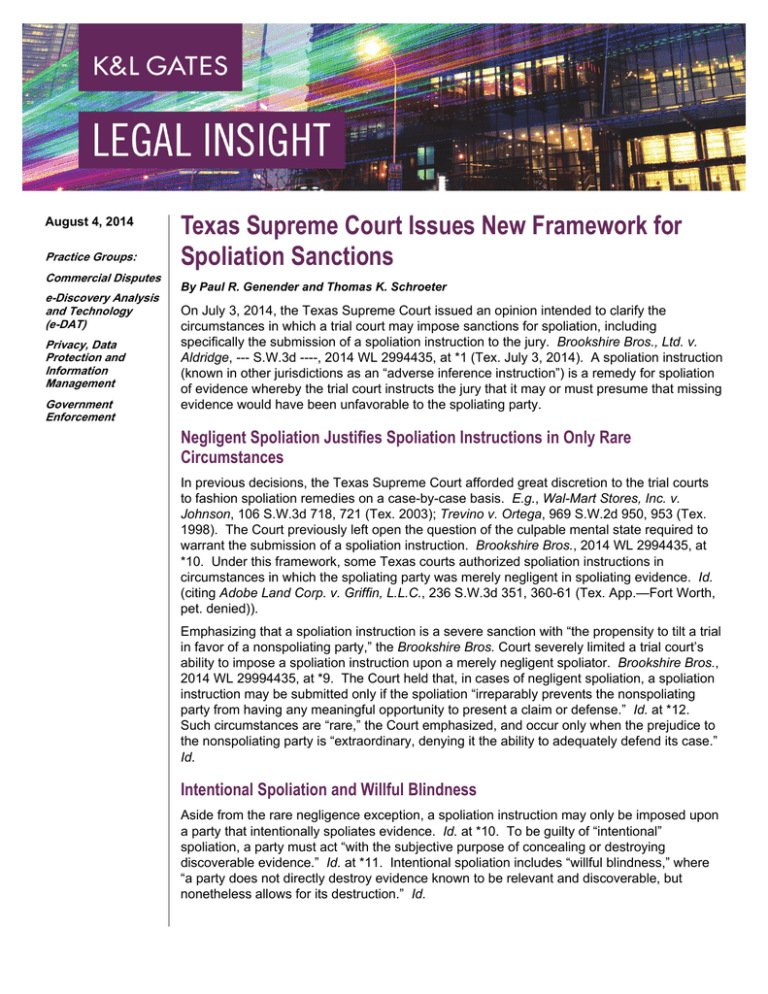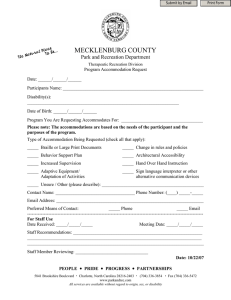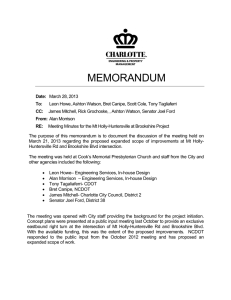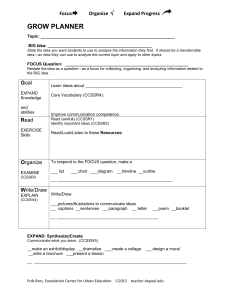
August 4, 2014
Practice Groups:
Commercial Disputes
e-Discovery Analysis
and Technology
(e-DAT)
Privacy, Data
Protection and
Information
Management
Government
Enforcement
Texas Supreme Court Issues New Framework for
Spoliation Sanctions
By Paul R. Genender and Thomas K. Schroeter
On July 3, 2014, the Texas Supreme Court issued an opinion intended to clarify the
circumstances in which a trial court may impose sanctions for spoliation, including
specifically the submission of a spoliation instruction to the jury. Brookshire Bros., Ltd. v.
Aldridge, --- S.W.3d ----, 2014 WL 2994435, at *1 (Tex. July 3, 2014). A spoliation instruction
(known in other jurisdictions as an “adverse inference instruction”) is a remedy for spoliation
of evidence whereby the trial court instructs the jury that it may or must presume that missing
evidence would have been unfavorable to the spoliating party.
Negligent Spoliation Justifies Spoliation Instructions in Only Rare
Circumstances
In previous decisions, the Texas Supreme Court afforded great discretion to the trial courts
to fashion spoliation remedies on a case-by-case basis. E.g., Wal-Mart Stores, Inc. v.
Johnson, 106 S.W.3d 718, 721 (Tex. 2003); Trevino v. Ortega, 969 S.W.2d 950, 953 (Tex.
1998). The Court previously left open the question of the culpable mental state required to
warrant the submission of a spoliation instruction. Brookshire Bros., 2014 WL 2994435, at
*10. Under this framework, some Texas courts authorized spoliation instructions in
circumstances in which the spoliating party was merely negligent in spoliating evidence. Id.
(citing Adobe Land Corp. v. Griffin, L.L.C., 236 S.W.3d 351, 360-61 (Tex. App.—Fort Worth,
pet. denied)).
Emphasizing that a spoliation instruction is a severe sanction with “the propensity to tilt a trial
in favor of a nonspoliating party,” the Brookshire Bros. Court severely limited a trial court’s
ability to impose a spoliation instruction upon a merely negligent spoliator. Brookshire Bros.,
2014 WL 29994435, at *9. The Court held that, in cases of negligent spoliation, a spoliation
instruction may be submitted only if the spoliation “irreparably prevents the nonspoliating
party from having any meaningful opportunity to present a claim or defense.” Id. at *12.
Such circumstances are “rare,” the Court emphasized, and occur only when the prejudice to
the nonspoliating party is “extraordinary, denying it the ability to adequately defend its case.”
Id.
Intentional Spoliation and Willful Blindness
Aside from the rare negligence exception, a spoliation instruction may only be imposed upon
a party that intentionally spoliates evidence. Id. at *10. To be guilty of “intentional”
spoliation, a party must act “with the subjective purpose of concealing or destroying
discoverable evidence.” Id. at *11. Intentional spoliation includes “willful blindness,” where
“a party does not directly destroy evidence known to be relevant and discoverable, but
nonetheless allows for its destruction.” Id.
Texas Supreme Court Issues New Framework for Spoliation Sanctions
A finding of intentional spoliation does not dictate that a spoliation instruction must be
submitted to the jury. Rather, a trial court, before imposing a spoliation instruction, must also
conclude that “a lesser remedy would be insufficient to ameliorate the prejudice caused by
the spoliating party’s conduct.” Id.
Application of the Court’s Framework
In Brookshire Bros., the plaintiff, Jerry Aldridge, was injured when he slipped and fell on a
puddle of grease at a Brookshire Bros. grocery store. Aldridge reported his injuries to the
store within five days of the incident. A store employee prepared an incident report based on
Aldridge’s statements and the recollections of the assistant manager on duty at the time of
the fall.
Aldridge’s fall was captured by a store surveillance camera. At the time of the fall, the store
camera recorded surveillance video in a continuous loop that, after approximately 30 days,
recorded over prior recordings. After Aldridge reported his injuries, Brookshire Bros.’ Vice
President of Human Resources and Risk Management decided to retain and copy
approximately eight minutes of the video, starting just before Aldridge entered the store and
concluding shortly after his fall. The remainder of that day’s footage was eventually deleted
pursuant to the operation of the continuous loop recording system.
Aldridge sued Brookshire Bros. for his injuries on a premises-liability theory. To satisfy his
burden of proof, Aldridge was required to prove that Brookshire Bros. had actual or
constructive knowledge of the grease puddle, which could be accomplished by showing that:
(1) Brookshire Bros. placed the grease on the floor; (2) Brookshire Bros. actually knew of the
grease on the floor; or (3) the grease was on the floor long enough to give Brookshire Bros. a
reasonable opportunity to discovery it.
During discovery, Aldridge requested from Brookshire Bros. a copy of its surveillance video
footage of the relevant portion of the store for the two-and-a-half hours preceding and
including the slip-and-fall. Brookshire Bros. was able to produce only the eight-minute span
that had been retained and copied; all other surveillance from that day had been recorded
over via the continuous loop recording system. Arguing that the deleted video would have
shown that the grease was on the floor long enough to give Brookshire Bros. constructive
knowledge, Aldridge requested spoliation sanctions, and the trial court submitted a spoliation
instruction. The jury returned a verdict for Aldridge, which the court of appeals affirmed.
The Texas Supreme Court reversed, finding under its new framework that the spoliation
instruction was an abuse of the trial court’s discretion. Id. at *14. The Court held that there
was “no evidence” that the failure to save additional video footage was done “with the
requisite intent to conceal or destroy relevant evidence or that Aldridge was irreparably
deprived of any meaningful ability to present his claim.” Id.
The dissent sternly criticized the majority for failing to find that Brookshire Bros. acted with
willful blindness. According to the dissent, “under the Court’s definition of ‘intentional,’ a
party that is aware of circumstances that are likely to give rise to future litigation but fails to
take reasonable steps to ensure the relevant evidence is not destroyed pursuant to ‘routine
practice’ may be found to have intentionally destroyed evidence.” Id. at *21. Thus,
according to the dissent, Brookshire Bros.’ failure to copy a greater portion of the tape
constitutes willful blindness that cannot be excused by the operation of the store’s automatic
deletion loop. The dissent concludes that “the Court’s assurances that its spoliation
2
Texas Supreme Court Issues New Framework for Spoliation Sanctions
framework encompasses instances of ‘willful blindness’ ring hollow given the Court’s
application of the concept to the facts of this case.” Id.
Conclusion
In Brookshire Bros., the Texas Supreme Court significantly reins in lower court discretion to
submit a spoliation instruction in cases of negligent spoliation. In most cases, therefore, a
court must find intentional spoliation. While the Court recognizes that willful blindness can
justify a spoliation instruction and defines “willful blindness” broadly, it did not find that willful
blindness was present under the facts presented in Brookshire Bros.
Authors:
Paul R. Genender
paul.genender@klgates.com
+1.214.939.5660
Thomas K. Schroeter
thomas.schroeter@klgates.com
+1.214.939.5844
Anchorage Austin Beijing Berlin Boston Brisbane Brussels Charleston Charlotte Chicago Dallas Doha Dubai Fort Worth Frankfurt
Harrisburg Hong Kong Houston London Los Angeles Melbourne Miami Milan Moscow Newark New York Orange County Palo Alto Paris
Perth Pittsburgh Portland Raleigh Research Triangle Park San Diego San Francisco São Paulo Seattle Seoul Shanghai Singapore Spokane
Sydney Taipei Tokyo Warsaw Washington, D.C. Wilmington
K&L Gates comprises more than 2,000 lawyers globally who practice in fully integrated offices located on five
continents. The firm represents leading multinational corporations, growth and middle-market companies, capital
markets participants and entrepreneurs in every major industry group as well as public sector entities, educational
institutions, philanthropic organizations and individuals. For more information about K&L Gates or its locations,
practices and registrations, visit www.klgates.com.
This publication is for informational purposes and does not contain or convey legal advice. The information herein should not be used or relied upon in
regard to any particular facts or circumstances without first consulting a lawyer.
© 2014 K&L Gates LLP. All Rights Reserved.
3





